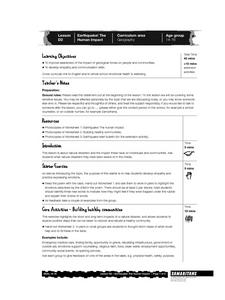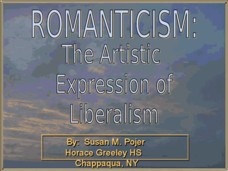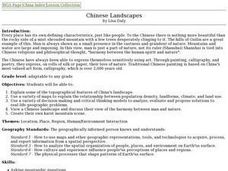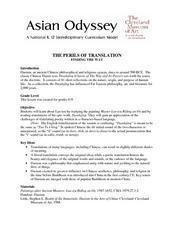Poetry Society
War Horse and WWI Poetry
Here's a resource that deserves a place in your curriculum library. As part of their study of War Horse individuals create an anthology of World War I poetry.
Curated OER
Earthquake! The Human Impact
Students explore the impact of natural disasters on communities. In this character education lesson, students examine poetry regarding an earthquake. Students discuss how to rebuild communities in the wake of natural...
Curated OER
Teaching the Holocaust Through Poetry
W.H. Auden’s poem “Refugee Blues” launches a study of the problems of refugees. Background information about the poem and general information about Jewish refugees from Germany and Austria are provided, as are discussion questions and...
Indiana University
Asian Literature: “The View in Spring” by Du Fu
Over the course of the lesson, your pupils read and analyze a translated eight-line poem from the Tang Dynasty written by Du Fu, a poet caught behind enemy lines during the An Lu-Shan rebellion (755-763). Literary/historical context is...
Curated OER
Romanticism: The Artistic Expression of Liberalism
The epic clash of reason and emotion comes to life in this informative presentation. Detailing the period of Romanticism in 19th century Europe, these slides contain pictures of the most famous pieces of art during this period. Viewers...
Curated OER
Wwf Activity on Exploring Feelings
Students explore feeling about the natural world and how those feelings are being affected by human action. They write poetry after viewing images of swallows in action and listening to poetry about the birds.
Curated OER
Lesson: Tlatelolco: Mexican Student Massacre 1968
The Massacre of Tlatelolco is the focus of a discussion-based lesson. Civil-minded learners consider the nature of student movements that have ended in violence based on over-reaction and government oppression. They discuss the social...
Curated OER
What is a Haiku? How Do You Write a Haiku?
Haiku poetry is explored in this language arts lesson. Yong readers identify the characteristics of haiku and read several examples. Students make connections between their study of Japan and the poetic form of haiku, and they write...
Curated OER
"Let Me Sing A Carefree Song Once More:" Poetry of Hidden Children
Students read various poems dealing with hidden children during the Holocaust. Using the texts, they discuss the poems meaning with their classmates. They present their information to the class taking turns on who is speaking. They...
Curated OER
A Poetic Finale
Young scholars write a poetic response to the Holocaust as a culminating activity to a unit on the Holocaust. They listen to and discuss a rap song about the Holocaust, complete various handouts, and write a poem for future generations.
Curated OER
From Rags to (Paper) Riches: Explore Colonial Papermaking
Young scholars explore Colonial papermaking. In this Colonial America U.S. history lesson plan, students analyze two poems written in the 1690s about the Rittenhouse paper mill to learn about papermaking. Young scholars...
Curated OER
Men of Steel
Students explore early 20th century steel making. In this U.S. history steel making instructional activity, students view and describe a postcard and a picture depicting exaggerated aspects of the steel industry. Students...
Curated OER
Chinese Landscapes
Students explain some of the topographical features of China's landscape. They view a Chinese landscape and discuss their view of the harmony between man and nature, then create their own karst mountain scene.
Curated OER
Urban Ecosystems 4: Metabolism of Urban Ecosystems
Cities are compared to living, breathing, metabolizing organisms. Fourth in a five-part series of lessons, this one focuses on the flow of materials through a city. Links to interesting websites and images make your delivery of...
Curated OER
Weather and Water in Ghana
Pupils research the rainy and dry season to investigate Africa's weather. In this African weather activity, students use the given websites to research the rainy and dry seasons of Ghana in Africa. Pupils then read stories about life in...
Curated OER
Aftermath and Universal Lessons of the Holocaust
Students reflect on the information given to them during the examination of the Holocaust. In groups, they answer hard questions about what they have learned and how they could make a difference in the world today. They also analyze...
Curated OER
Learning About Location: Charting the Path of the George W. Elder
Young scholars acquire a working knowledge of the geographical concepts: absolute location, relative location, longitude and latitude. They analyze primary sources that shows the physical and human characteristics of the places along...
Curated OER
Hunters and Gatherers
Sixth graders participate in mapping and other activities to understand why ancient civilizations developed as they did. In this ancient civilization instructional activity, 6th graders recognize that there were three important climate...
Institute for Humane Education
In Your Face: Reclaiming Billboards
Ads here, ads there, ads everywhere—but what do they communicate? Pupils discuss this topic and develop a list of personal values. They then work as creative directors at an advertising firm to create billboards that reflect community...
Curated OER
Literature and History of the Holocaust
Students examine quotes and text passages related to the Holocaust. They generate a list of questions about the Holocaust and analyze a piece of writing based on the authorship of the work. They infer the meaning of a poem and determine...
Curated OER
The Perils of Translation
Students discover the challenges of translating poetry written in a character-based language through the study of Lao-tzu's work, Daodejing. This lesson includes possible extensions and evaluations.
Curated OER
Water Stories
Young scholars interpret historical accounts, stories and customs to draw conclusions about the people who populated New Mexico and their relationship to water. They describe the human and natural characteristics of places in New Mexico.
Curated OER
A Share in America
Learners examine map - reflect on why English colonist kept coming to America (scarcity of land in England / seemingly endless land in America)
Recite line from English poem. They discuss English attitude towards Indians and their lands.
Indiana University
World Literature: "One Evening in the Rainy Season" Shi Zhecun
Did you know that modern Chinese literature “grew from the psychoanalytical theory of Sigmund Freud”? Designed for a world literature class, seniors are introduced to “One Evening in the Rainy Season,” Shi Zhecun’s stream of...























